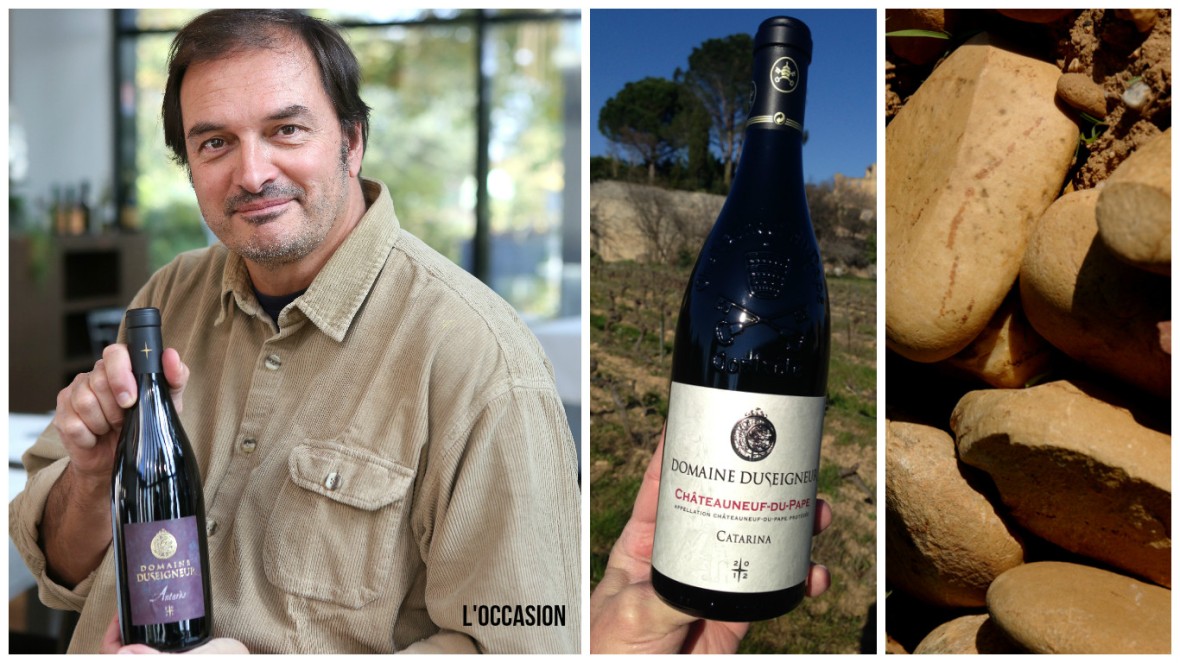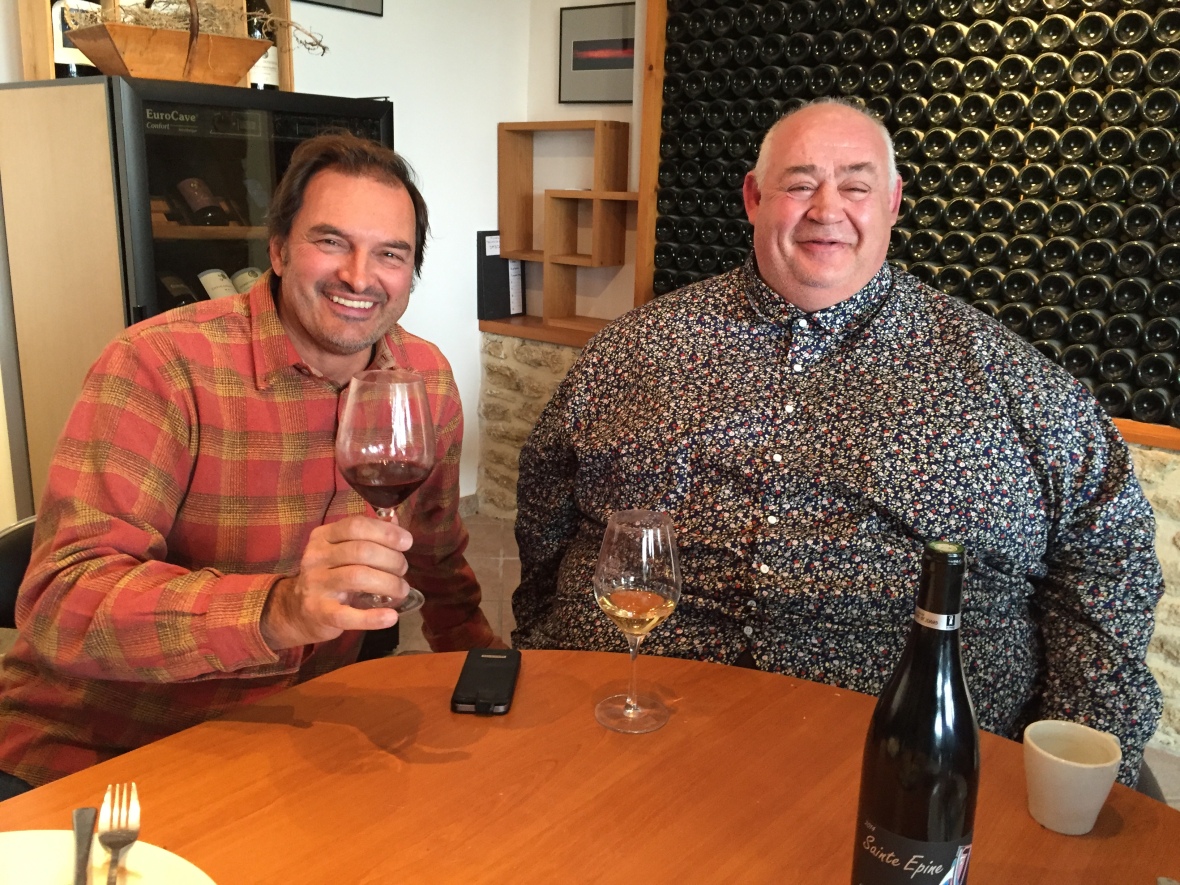Today we welcome a rendezvous with Bernard Duseigneur, the winemaker at Domaine Duseigneur. The 30-hectare estate spans Châteauneuf du Pape, Côtes-du-Rhône Villages Laudun and Lirac.

Duseigneur (right) and Philippe Faure-Brac at the Salon Rencontres Vinicoles and Gala Dinner at Pavillon Kleber. October 2014. Photo Credit: Domaine Duseigneur
I clicked on an Instagram photo of three bottles of wine from Châteauneuf du Pape. “Wonderful,” I commented. “I’d love to try.”
“If you come over here our doors are widely open for a tasting 😊.” Bernard Duseigneur responded.
This exchange offered me the opportunity to get know the wines and winemaker of Domaine Duseigneur because Duseigneur agreed to answer some questions and share his story of making wine in one of my favorite regions, a place that has been consecrated by history, pedigree, nature and dedication from the vignerons of the Southern Rhône.
Domaine Duseigneur History

Photo Credit: Domaine Duseigneur
Domaine Duseigneur was originally founded by Bernard’s father, Jean. Jean recognized the potential of the wildland that would eventually become the family-owned vineyard that it is today.
“He started developing his vineyard the way he had been taught by his ancestors, based on the knowledge that it would be the soil which would secure the long-term future of the vineyard and unique qualities of the grapes grown on that land.”
This was in the 1960s and before the consumer effort (and grower value) of organics and biodynamics became what they are today. Still, Jean did what he felt was right for the land and for the grapes, keeping chemicals off the vines and leaning on ancient inclinations to follow biodynamic methods. In the early 1990s, the vineyard tradition was passed from Jean to his two sons, Bernard and Frederic, who are at the helm today. Their team includes Philippe Faure-Brac, 1992 World’s Best Sommelier, who serves as a constant participant in the winemaking process.
Biodynamics
In the consumer marketplace, there has been a recent push to codify labels to reveal exactly what is contained in the product. Not only the contents but also what practices exist during the composition and handling of the product. For example, the United States has recently passed federal legislation that would require all products to clearly indicate if Genetically Modified Organisms (GMOs) are present in consumable items.
If the previous paragraph feels dry to you (honestly, did you skim it?) it is because the topic has grown tedious, moving away from the delicious, nutritious, glory of eating and drinking, of enjoying the items on our table.
Many say we’ve lost connection with what we put into our bodies, that we’ve become machine-like in our production and consumption, sometimes quite literally.
Biodynamic practices seek balance through the experience of the grower, the land on which the vines grow, the vines themselves and the surrounding environs. Biodynamics often include what we’ve come to know as organic (rejection of all chemical applications), but that’s only part of the ongoing reality that is a biodynamic vineyard. And while there is no program (no Martha Stewart monthly to-do) for a biodynamic setting, there are guiding principals of balance, authenticity, nature, creativity and love.
Perhaps the main ingredient is indeed the love shown by a grower who is willing to stay on the path, rather than allow a shortcut. For instance, the Duseigneur team churn their clay-based soils by hand with pickaxes designed by their own blacksmith. Using machines would place undue pressure that compacts the soil. Rows of trees delineate their plots to prevent contamination. 20% of the estate is natural, uncultivated terrain to encourage natural predators to thrive near the vineyards.
According to Duseigneur, “After years of practice, experiments and exchanges, we realized that, in order to produce high-quality grapes, the vine needs much more than a simple set of nutrients, but a more refined nourishment, almost spiritual, that can only be created by the presence of a fauna and a flora that are as rich and diversified as possible. And, of course, a permanent link to the vigneron!”
Meet Bernard
My connection with Duseigneur happened in an entirely organic way. From the small exchange on Instagram, I came to learn that his work was exactly the type I find compelling. I’ve written about Southern Rhône and Provençal winemaker extensively, and I have a particular interest in bio estates of southern France. When I emailed him, it was with fingers crossed that he’d respond.
The questions below come primarily from my twitter friends, wine lovers with curiosities. I’m enthusiastic to share what I’ve learned about Domaine Duseigneur with you.

Photo Credit: Domaine Duseigneur
Tell us about the history of Domaine Duseigneur?
Domaine Duseigneur’s estate was created by my father in the late ’60s when my family settled down in the south of France coming from Algeria after the independence war. My father planted the vineyard on hillsides that had never been cultivated before. As he never used any chemicals, our land has always been organically farmed. When I took over in 2002, I decided to apply for Biodynamics as I realized it was the best way to truly express the sense of soil and the minerality into my wines. Now the estate is spread across both sides of the river Rhône covering 82 acres, 37 of them being in Châteauneuf du Pape where the winery is located.
Which of your wines was the most difficult to craft and what have you learned from this experience?
It is always a challenge to make a terroir-driven wine as you never fully understand how the minerality of the soil shows up in the wine and eventually dominates the fruit itself. That is why, in my opinion, biodynamie is so important because it is about getting a root system deeply down into healthy and bio-diversified soil. But this is taking years of work and the result is not guaranteed as Nature always has the last word!
What concerns you most in your area? Water scarcity, soil erosion, pests … etc …

A view of another estate, St. Préfert, in Châteauneuf du Pape. Photo Credit: Domaine Duseigneur
The Southern Rhône area is blessed with the holy trinity of sun, wind and the famous stones. Over here ripeness is rarely a problem, but over-ripeness could lead to a lack of freshness. We have to be very careful in keeping the right balance of alcohol, acidity and tannins. As they say, without balance no pleasure! That’s why the picking date is so important…and the harvest period so stressful!
What are your challenges with the new vintage?
Every year I tell myself, ‘Try to do the best you can from what Mother Nature is giving you… and don’t spoil it in the cellar!’ Well, I don’t see why it should be different this year! But I won’t be relaxed until the crop is safely stored in the cellar.
What bottle, yours or another vintner’s, will you be drinking for dinner?
At this time of the year [interview conducted in summer], I often go for a rosé, the ideal companion of the Mediterranean cuisine! Our Côtes du Rhone Villages 2015 100% Grenache will be perfect for tonight’s BBQ.
Tell us how you became a winemaker?
I am the fifth generation of winemaker in my family. But I started my career as a banker and only got back to my roots when I felt ready for it in my 40s!
Of course, it is great to make a living from my passion. But I also like the idea of playing a small part of a long history in the French wine tradition. And I hope to pass on an exciting project and a healthier land to my successors.
Do you have a local chef that you recommend for a recipe or pairing?
My favorite restaurant near Châteauneuf du Pape is La Table de Sorgues. Jean-Paul Lecrocq is a real artist in the kitchen and his wife Sandrine will pick the best wine pairing for you.
Is there someone that works on your estate that you’d like to highlight, thank, gush about?
I would certainly like to pay a tribute to Philippe Cambie, our greatly talented oenologist. He is the best connoisseur of the Grenache variety I ever met. His knowledge and understanding of the Châteauneuf du Pape wines are absolutely outstanding. His contribution and friendship are of great value to me.

Duseigneur and Philippe. Photo Credit: Domaine Duseigneur
Can you recommend a wine book?
I really enjoyed Comment Gouter un Vin (How to Taste a Wine) by my friend Philippe Faure-Brac. The wine stripped from its label, presented from the senses’ point of view. It’s a very original approach for a French sommelier. It helps to focus on what you feel during a tasting and that’s all that matters after all. Unfortunately, the book is not available in English.
Domaine Duseigneur
Thank you to Bernard for contributing to this piece. It will also be available here in French within the next few weeks. If you live in France, find their highly-acclaimed wines in shops throughout the country. They can also be ordered for delivery within France or for purchase in countries where imported.
Domaine Duseigneur
14, Chemin des Garrigues B.P.11
84230 Châteauneuf du Pape
France
Phone : +33 (0) 490 02 08 17


You get on out there and use the isolated world of social media to make a friend and get to know someone. Good for you, Jill. One day we will have to taste together in person.
LikeLike
Phooey, Jill let me change that WP name so you know who wants to drink with you.
LikeLiked by 1 person
No problem! Thanks for your comment & for reading!
LikeLike
I really would love to work in a vineyard. I just feel at peace there. What a craft!
LikeLiked by 1 person
How about the biodynamique practices? Doesn’t it create such a powerful connection with nature? Wow!
LikeLike
Yes. It is the right way to do it.
LikeLiked by 1 person
Nice!
LikeLiked by 1 person
Thanks!!!
LikeLike
I’m hoping that I can intern at a biodynamic vineyard, much like Domaine Duseigneur, sometime over the next year. Great post!
LikeLiked by 1 person
How incredible! Enjoy each moment!
LikeLike
A very nice and informative interview!
LikeLiked by 1 person
Thank you for reading along. Cheers!
LikeLiked by 1 person
I really enjoyed this and the format is a fun change up for you. And believe me sweet girl no one (especially if they know you) would ever stand you up via email or otherwise.
LikeLiked by 1 person
Lovely article, beautiful photos! Wanderlusting now…..
LikeLiked by 1 person
Excellent article – and I did gloss over the biodynamics paragraph :). I’ll keep Duseigneur up my sleeve for the next time we are looking for a chateauneuf-du-pape. I love the southern wines particularly the reds. I’m somewhat deprived in that respect in the Loire because the wines are so much lighter but our cellar is eclectic.
LikeLiked by 1 person
If you go, please share the story!
I’m sure you’ve got some gorgeous wines to choose from: to drink & save!
LikeLike
I must absolutely taste these wines now that you have introduced me to Bernard. Love the passion and attention to detail. Thanks so much for sharing Jill. Now scheming a trip to Avignon and beyond
LikeLiked by 1 person
Sounds like an excellent plan! Thanks for reading & for your kind words!
LikeLike